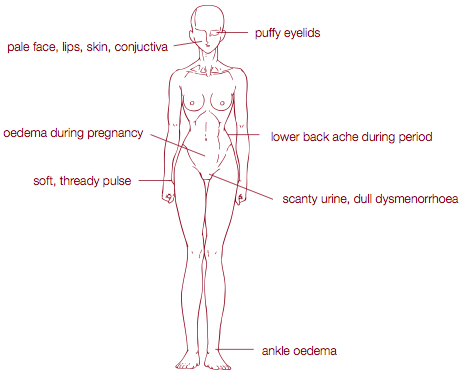DANG GUI & PAEONIA
Dang Gui Shao Yao San
‘Dang Gui and Paeonia Decoction’
Source: Essentials from the Golden Cabinet (Jin Gui Yao Lüe, 200)
Keywords
Menstrual disorders with fluid metabolism problems, oedema during pregnancy

Ingredients
Angelica sinensis (Dang Gui)
Paeonia alba (Bai Shao, white peony)
Ligusticum walichii (Chuan Xiong,
ligusticum)
Atractylodes macrocephala (Bai Zhu, atractylodes)
Poria cocos (Fu Ling, hoelen)
Alisma orientalis (Ze Xie, alisma)
Indications
* Fluid metabolism and urinary disturbances associated with menstruation and pregnancy.
* Threatened miscarriage or habitual miscarriage. This formula may be used both during pregnancy and
between pregnancies.
* Pre-menstrual syndrome—breast swelling, fluid retention.
* Mild dysmenorrhoea, usually towards the end of the period. The pain may be relieved by pressure.
* With the appropriate key symptoms, this formula can be used to treat biomedical conditions such as
chronic nephritis, chronic cystitis, anaemia, irregular menstruation, pre-eclampsia, infertility, lumbago,
hypotension, primary dysmenorrhoea and leucorrhoea.
Haemopoietic, diuretic.
* With cold limbs, add Gan Jiang & Rou Gui
* In hot patients, add Shan Zhi Zi & Mu Dan Pi.
* With severe oedema, combine with Wu Ling San.
* For threatened or habitual miscarriage, combine with Shou Tai Wan.
* For backache during menstruation, add Du Zhong & Xu Duan.
* For oedema during pregnancy with symptoms of low back pain, lethargy, knee pain, clear polyuria, and a pale tongue add Xian Ling Pi & Xian Mao.
Key symptoms for use
* generalised pallor (face, nails, conjunctiva)
* fluid retention, oedema
* scanty or infrequent urination
* puffy eyelids and fingers especially in the morning (‘rings feel tight’); patients may note that their weight
can fluctuate by kilos before and after menstruation
* pale, probably swollen tongue (with tooth marks)
Cautions and contraindications
None noted.
Not to be taken during the early phase of acute illness such as colds and flu.
Occasionally some sensitive patients may react to the Dang Gui (which can be a little hard to digest) with bloating and indigestion. If so, a small dose of a digestive regulating combination such as Xiang Fu & Sha Ren will alleviate the reaction.
The typical dose is three grams 2-3 times daily, before meals. In severe cases or the early stages of treatment (the first two weeks), a 50-100% increase in dose may be used, then reduced as the treatment takes effect.
Differentiation
Xiao Yao San: Also used for the symptoms of premenstrual syndrome, but better when there is a clear
emotional component associated with the disorder, that is, the symptoms are worse when the patient is
stressed.
Wu Ling San: Promotes urination, but has no tonic component. Sometimes combined with the primary
formula for severe oedema.